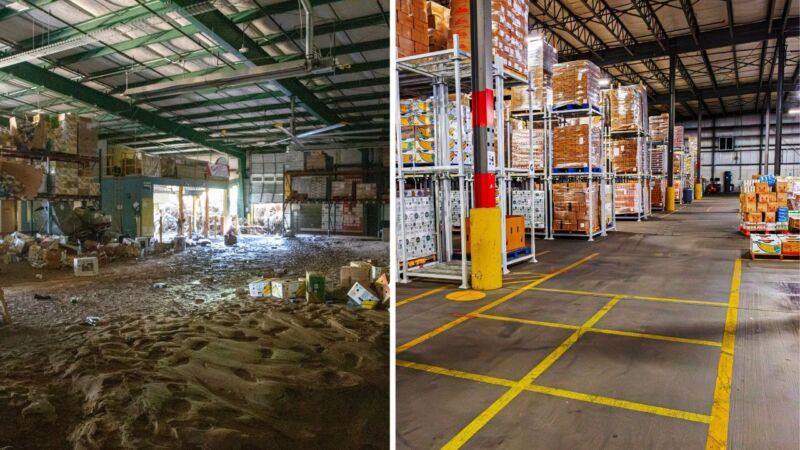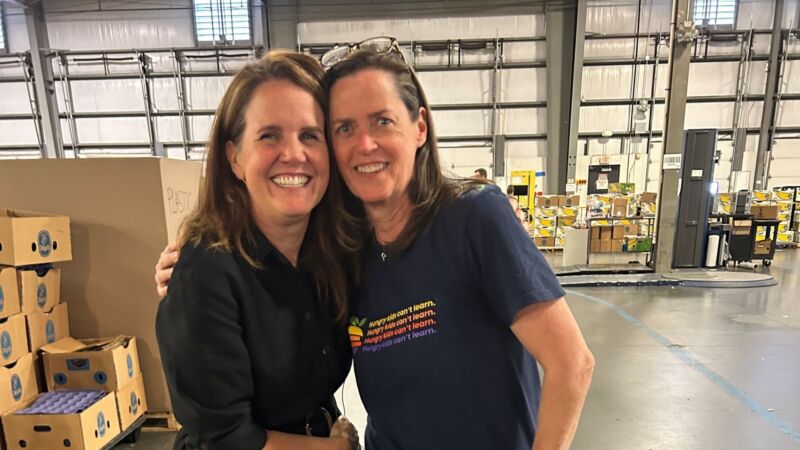In the aftermath of Hurricane Helene, which devastated communities across western North Carolina, the North Carolina Community Foundation and The Community Foundation of Western North Carolina came together in a powerful demonstration of partnership and purpose. Their shared goal was to help restore MANNA FoodBank, the region’s only food bank and a vital lifeline for thousands of families.
“I’ve never experienced anything like it. Our buildings were completely destroyed. Our food trailers were miles down the road. It was beyond describable,” said MANNA CEO Claire Neal. The damage to MANNA’s facility threatened food access for more than 220 partner agencies, 100 schools and tens of thousands of people already facing hunger.
Quick action and shared purpose
Within days of the storm, CFWNC launched its Emergency and Disaster Response Fund. “We just acted,” said CFWNC President and CEO Elizabeth Brazas. “We knew money was going to need to go out quickly for medicine, food, rescue, and recovery.” As needs mounted across the region, Brazas and NCCF President and CEO Jennifer Tolle Whiteside stayed in close contact. “Jennifer was an emotional support for me,” Brazas recalled. “That mattered.”
While CFWNC’s fund was focused on immediate needs, NCCF’s Disaster Relief Fund supported mid- and long-term recovery. Months after the storm, as the full scope of MANNA’s losses became clear and a viable plan emerged, the two foundations joined forces to make a transformational investment.
The result was a $7 million joint grant to MANNA, with each contributing $3.5 million, the largest grant either foundation had ever made from a disaster fund.
“We were so proud to partner with the Community Foundation of Western North Carolina,” said Tolle Whiteside. “Community foundations know their communities and are in a unique position to really facilitate community needs assessments and look at what is really happening on the ground.”
MANNA’s fast pivot and fortunate break
At MANNA, the need for support was urgent and total. “We were sitting on beach chairs in an empty building,” said Neal. “There was no electricity, no internet and no phones. When Elizabeth reached out to ask what we needed, that call was everything.”
Just days before the hurricane, MANNA’s board had voted to begin due diligence on a potential new warehouse space, a decision that would prove critical. “We were unbelievably lucky,” Neal said. “We secured an emergency sublease for a building just in time. Without it, I can’t even imagine how we would’ve responded.”
The joint grant allowed MANNA to outfit the new facility with everything from freezers and coolers to furniture and dock equipment. “Finishing the freezer and cooler build-out is game-changing,” she said. “It’s nearly triple the cold storage we had before. It gives us room to grow with the need.”
That need continues to grow. In May alone, more than 189,000 people turned to MANNA for emergency food assistance, the highest number in its 42-year history.

When Hurricane Helene devastated MANNA FoodBank’s facility (left), a $7 million grant from NCCF and CFWNC helped cover the remaining costs of completing its new facility (right).
A partnership grounded in trust
The support from the two foundations extended beyond infrastructure. “We were able to put funds toward some of the places they weren’t able to raise money for,” said Tolle Whiteside. “We were really proud to support that.”
For both Brazas and Tolle Whiteside, the grant symbolized more than disaster response. “Community foundations serve their communities, are incredible partners, and can come together in times of disaster and in good times to support the community with trusted, direct support,” said Tolle Whiteside.
And for Brazas, the experience reinforced the power of long-standing relationships. “The community foundations in North Carolina are partners already,” said Brazas. “Having those relationships like we have with MANNA, with the community, with funding partners, that’s what helped us move so quickly. That is based on trust…I think that North Carolina’s philanthropy stepped up in a way other people should model.”
This article was written by Jason Jennings of the North Carolina Community Foundation.

